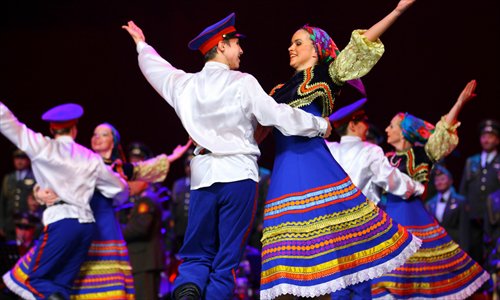Russian song brings nostalgia in China

Russian dancers performed classic songs including "Katyusha" and "Moscow Night" in Haikou, Hainan Province, in 2012. Photo: IC
The classic Russian song "Katyusha" stirred feelings of excitement and nostalgia in all who heard it as it played during the appearance of China's People Liberation Army at a military parade in Russia on Saturday.
While Russians stood proud for their country's grand and impressive military parade celebrating the 70th anniversary of the Great Patriotic War (Nazi-Soviet War 1941-1945), their Chinese counterparts, especially older generations who were born before the 1950s, enjoyed a different kind of excitement when the PLA made its appearance.
One of the most popular Russian songs in China in the past century, "Katyusha" stands apart from other popular Russian songs which mainly spread to China during peacetime after the end of the WWII. Created in the 1930s and going on to become quite popular on the Russian battlefield in the early 1940s, "Katyusha" soon spread to China where it was sung by Chinese soldiers.
After the People's Republic of China was founded in 1949, "Katyusha" together with other Russian songs which were later introduced to China such as "Cranberry Flowers Blossom Out" and "Moscow Nights" enjoyed great popularity among the Chinese public stimulated by the general intimate relationship between the two countries. The popularity of these songs reached a point in China that at the time young people would deem it a great shame if they couldn't sing them.
"I'm really proud to be able to sing this song that is so familiar among both the Russian and Chinese people," said Zhang Hongjie, the flagman for the Chinese honor guard that attended the Russian parade. During rehearsals, their ability to sing the Russian language song not only surprised their Russian peers, but also moistened the eyes of young soldiers even though the latter had never experienced Word War II.
In Russia "Katyusha" embodies the various beautiful and noble characteristics that the ideal woman would possess. Inspired by the eponymous poem by Russian poet Mikhail Isakovski, the country's famous composer Matvey Brontel adapted the poem into a song which was first performed in concert in 1938.
The first time "Katyusha" became connected to the war was in 1941 when female students from a Moscow college sung it as a farewell to a group of soldiers. Soon the song was sung pervasively among those soldiers on the front line.
Although the relationship between the two countries suffered serious setbacks for a period, the influence of Russian cultural symbols showed no signs of fading in China until the turn of the century. In the 1970s, labeled as "pornographic" due to the country's strict control on culture, "Katyusha" became a forbidden song. But that still didn't stop the song from becoming popular again during the 1980s after China's implemented its reform and opening-up policy.
If you search for "Katyusha" online you can easily find various nostalgic articles about representative Russian songs and films in China. Among the various hot spots that Chinese tourists have swept through overseas these years, the Katyusha Museum located in a remote village in the State of Smolensk Oblast has also attracted a huge number of older Chinese looking to remember this song of their youth.
Among the various collections that the museum possesses, a letter from a China's Xinjiang Uyghur Autonomous Region demonstrates people's deep attachment to Russian culture at the time.
"As a science researcher who specializes in geology, I never had much artistic talent, but since the 1950s I have been deeply enchanted with the song 'Katyusha.' Now I have a daughter, I even named her Qiusha (Katyusha in Chinese is Ka Qiusha)."
Global Times
Newspaper headline: The siren call of memory